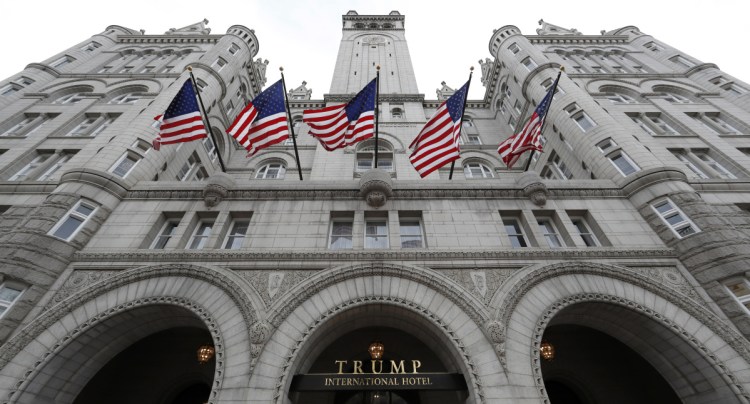When someone works so hard to keep something from you, there’s usually a good reason.
That’s the lesson of Paul Le-Page’s long-awaited travel receipts.
First requested by the Portland Press Herald/Maine Sunday Telegram in March 2017 after then-Gov. LePage made a series of trips to Washington, D.C., it took the election of a new administration to finally make them public.
And now we can see why. The receipts and accompanying emails show LePage and members of his administration spent thousands of taxpayer dollars at luxury hotels and high-end restaurants. They detail $1,100-a-night hotel rooms, $55 steaks and the state controller’s concerns that there was overspending. They reveal that taxpayers paid for rooms for LePage’s adult children, although they were not on his staff at the time.
Most concerning, the receipts show LePage returned again and again to D.C.’s Trump International Hotel, spending at least $22,000 of Maine taxpayer money over two years at the site owned by the president and operated by his two sons.
The information is deeply embarrassing for a chief executive who styled himself as the one true defender of public money – and who spent much of his eight years in office trying to dictate with great precision which foods poor Mainers should be able to buy with public assistance.
It also places LePage squarely in the center of a controversy over the intersection of Donald Trump’s presidency and his wide-ranging, not-fully-understood business dealings.
In January, a federal watchdog said the Trump Organization’s lease on the hotel property was not properly reviewed following Trump’s election, and may be unconstitutional.
There also are legitimate concerns with the way foreign governments and others are able to funnel money to the Trump Organization through its properties in order to gain favor with the president.
As such, LePage’s travel receipts will be part of a lawsuit filed by Washington, D.C., and the state of Maryland, which contends that the president, through his hotel, is illegally profiting from his position.
But to listen to LePage, none of that mattered when it came to the Press Herald’s initial records request and its many follow-ups. What kept the records hidden for nearly two years wasn’t the evidence of hypocrisy or the questionable allegiance to the president’s hotel.
No, his office argued, what slowed the response was the sheer volume of information requests and the difficulty in retrieving them – plus, a spokesman said, the requests were nothing but “media-fueled hysterics.”
Of course, the Maine Department of Public Safety, which provides the governor’s security detail, responded to a similar request within two months, and the new Mills administration had no trouble making the records public within weeks of taking office.
It’s clear that LePage could have produced the receipts whenever he wanted to. He didn’t because the information they contained was not flattering – and because Maine’s freedom of access law is utterly toothless.
In the absence of a stronger law that makes public records truly public, we should remember this episode. We should remember how LePage said, “Nothing to see here” while freely spending taxpayer money, a lot of it to the president’s private business.
We should remember that when a person in power tries to hide something, that usually means they have something to hide.
Send questions/comments to the editors.


